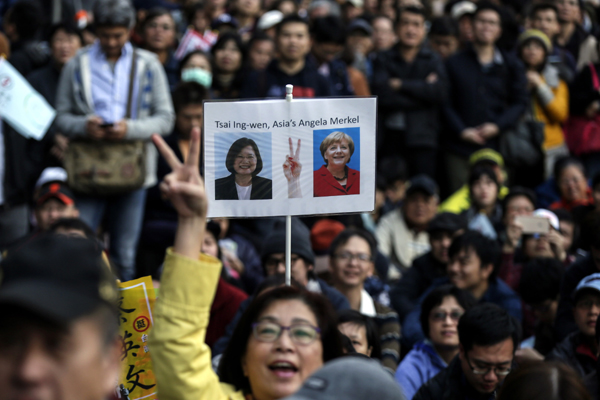
Taiwan opposition wins presidency, China ties could suffer
TAIPEI, January 16, 2016
Taiwan's independence-leaning opposition leader Tsai Ing-wen won a convincing victory in presidential election on Saturday and pledged to maintain peace with China, which claims the island as its own, though vowed to firmly defend Taiwan's sovereignty.
Tsai, leader of the Democratic Progressive Party (DPP), will be thrust into one of Asia's toughest and most dangerous jobs, with China pointing hundreds of missiles at the island, decades after losing Nationalists fled from Mao Zedong's Communists to Taiwan in the Chinese civil war.
Tsai risks antagonising China if she attempts to forcefully assert Taiwan's sovereignty and reverses eight years of warming China ties under incumbent President Ma Ying-jeou of the Nationalists, whose forces retreated to Taiwan in 1949.
Tsai said she would establish "consistent, predictable and sustainable" relations with China and not be provocative, to ensure the status quo.
"Both sides have a responsibility to do their utmost to find mutually acceptable ways to interact with respect and reciprocity and ensure no provocation and no surprises," Tsai added, having taken more than half the vote.
She added, however, that she would defend Taiwan's interests and its sovereignty. China has not renounced the use of force to ensure eventual unification with the island.
"Our democracy, national identity and international space must be fully respected and any suppression would undermine the stability of cross-Strait relations," she said.
Support for the DPP has swelled since 2014, when hundreds of students occupied Taiwan's parliament for weeks protesting against a China trade bill in the largest display of anti-China sentiment the island had seen in years.
Outside DPP headquarters, supporters cried for joy.
Optometrist David Chen, 28, said he wanted Tsai to stand up to China.
"We're not a part of China. I definitely think we should exist as two countries," he told Reuters. "If it's possible for Tsai, I want her to push for independence. More and more Taiwanese people want this."
Tsai, a lawyer, got an even stronger mandate as the DPP also won parliamentary polls which were being held the same day, though the margin was not immediately clear.
Tsai will have to balance the superpower interests of China, which is also Taiwan's largest trading partner, and the United States with those of her freewheeling, democratic home.
The US State Department said it looked forward to working with Tsai.
"We share with the Taiwan people a profound interest in the continuation of cross-Strait peace and stability," it said.
Still, underscoring investor worries about uncertainly following her possible victory, on Friday the Taiwan dollar ended lower against the US dollar in its weakest closing since April 2009. Following the vote, a senior central bank official told Reuters that Taiwan's central bank "always maintains stability in the market".
There was no immediate reaction from Beijing to her election. The official Xinhua news agency noted in a brief report that Tsai had won the "Taiwan region leaders' election".
In a statement carried by state media earlier in the day, China's Taiwan Affairs Office repeated it would not get involved in the election, saying only that it was "paying attention to across the Taiwan Strait".
Perhaps fearful of allowing discussion about democracy on an island Beijing says it owns, Chinese censors moved swiftly to block searches for Tsai's name on Weibo, China's answer to Twitter.
Some Chinese managed to post about the vote though.
"Why is there no election for the chairman in China? I condemn this," said one Weibo user.
Relations had already been strained by a 16-year-old Taiwan singer with a South Korean girl band who inadvertently shot to the top of the election agenda on polling day after she publicly apologised for holding a Taiwan flag, prompting China and Taiwan to trade accusations.
Tsai referred to the spat in her victory speech, saying the incident would remind her that as president her most important duty was to unite and strengthen the country.
The election comes at a tricky time for Taiwan's export-dependent economy, which slipped into recession in the third quarter last year. China is also Taiwan's top trading partner and Taiwan's favourite investment destination.
Tsai has the tide of history against her. Ma and his predecessors all failed to bring about a lasting reconciliation with China, which considers Taiwan a rogue province to be taken by force if necessary.
Shots were traded between the two sides as recently as the mid-1970s.
At stake are relations with an ascendant and increasingly assertive China under President Xi Jinping.
Tsai has been ambiguous on her China policy, merely pledging, in public anyway, to maintain the status quo. Beijing has warned repeatedly that hard-earned peace across the Taiwan Strait could be affected by a Tsai win.
The United States has expressed concerns about the danger of worsening China-Taiwan ties, at a time when China's navy is increasingly flexing its muscles in the South China and East China Seas and expanding territorial claims.
China has held out the "one country, two systems" formula, under which the British colony of Hong Kong returned to China in 1997, as a solution for Taiwan. But both the Nationalists and DPP have rejected the idea.-Reuters







